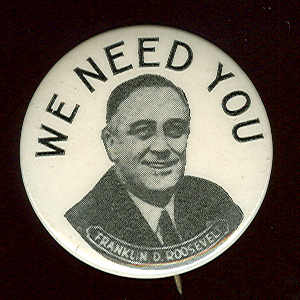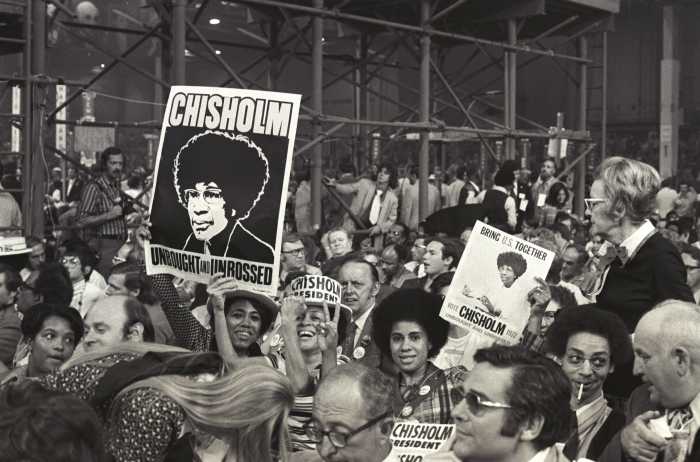By JERRY TALLMER | When I close my eyes and bear down, I can see two men in what used to be called plus fours — golf knickers — standing on a patch of grass beside a road, or perhaps a railroad track, engaged in casual political conversation.
One of these men is my father, Albert F. Tallmer, then some 37 or 38 years old.
“I don’t know,” he is saying to the other golfer, “but this young Roosevelt [then 48 or 49 years old and governor of New York State] might just be able to get us out of this mess.”
By “this mess” my father meant the Great Depression.
It is the first time in my own then quite young life that I have — so far as one can at this vast gap remember — been aware that someone named not Theodore but Franklin D. Roosevelt might one day be running for president of these United States of America.
Quick cut to another image perhaps a year or two later. It is Election night, 1932, three years and three months after the violent stock market crash which has plunged this nation and much of the rest of the world into nightmare. Men who once had plushy jobs are selling apples on many a street corner. Men who had even plushier jobs are jumping out of high windows — a weird prelude to the very different and much higher windows of 9/11/2001. And I, way back there in boyhood, am sitting listening to the radio — a cathedral-arched ancient Atwater Kent — with tears cascading down my cheeks.
I am crying because Gee Gee is crying because poor nice President Herbert Hoover is getting trounced all across the map of this country. Mr. Herbert Hoover, who sees a rainbow in the sky, will not be re-elected president. So let’s have another cup of coffee, and — thank you, Irving Berlin — let’s have another piece of pie. Franklin Delano Roosevelt has just been elected 32nd president of these United States. The take-charge Democrat has beaten the do-nothing Republican.
Gee Gee — my surrogate mother — very much wanted the Republican to win. Gee Gee’s actual name is Blanche Avalony, because she is married to an Italian-American white man. She is a tiny, carrot-topped, colored woman who lives with her husband and a small dog on 112th St. in Harlem, but she was born and bred in North Carolina and knows in her bones that Republicans are far less prone than Democrats — Southern Democrats like evil old whiskey-drinking John Nance Garner, Roosevelt’s running mate — to hang black men from the nearest tree, and worse. One of these days not far off, Billie Holiday will sing a song about all that. It withers the soul to this day.
So Blanche Avalony, who came to work to take care of me and my parents’ household when I was born, and stayed in that employ until my father died 30 years
later, did not want Roosevelt to beat Hoover in 1932, even if she a long time later may have quietly
changed sides.
My father made no bones about whom he was for when, four years later, 1932 closed in. As the cliché goes, he threw his straw hat into the ring for Roosevelt. Which takes us to another picture in my head, four years later still. October 31, 1936. Madison Square Garden, the old (but not oldest) Garden at 50th Street and Eighth Avenue, where our city’s ugliest, skyscraping office building stands today.
On Tuesday morning, November 2, 1936, Americans from coast to coast will start going to the polls. Now, in the Garden, F.D.R. is closing out that year’s presidential campaign with the greatest, most fiery speech of his life — again an extraordinary prelude or pre-vision of things to come in this insane election year of 2012, seven and a half decades later, here is the core of it. Makes me shiver just to type it:
“We had to struggle with the old enemies of peace — business and financial monopoly, speculation, reckless banking, class antagonism, sectionalism, war profiteering.
They had begun to consider the government of the United States as a mere appendage to their own affairs. We know now that government by organized money is just as dangerous as government by organized mob.
Never before in all our history have these forces been so united against one candidate as they stand today. They are unanimous in their hate for me — and I welcome their hatred.”
Get that: And I welcome their hatred ….
Roosevelt is saying all this, and I am standing on a wooden folding chair in the Garden in the midst of 18,000 people, clutching my father’s shoulder and screaming my head off. I used to write about that chair so often that my buddies used to say: “Here comes Jerry with that chair again,” so I put it on ice, so to speak. But when I listen to the derangements and racist foamings and cockamamie outright lies of the whole friggin’ crew from Palin to Paul to Newt to Mitt and back again, it’s time once again to drag out that good old rickety wooden contraption and stand on it.
Another much-revisited picture in my head: Times Square a few nights later — Election night, 1936. I am there, my father is there, and a half a million other people are there.
My father and I fight our way to where we can have a good view of the Election Scoreboard on the facing of The New York Times building at the south end of Times Square. In my dad’s hands are a pencil or pen and a copy of the Literary Digest, a magazine then famous for its political polls, this year of 1936 not least, when it has predicted the victory of Alfred M. (“Alf”) Landon, Republican governor of Kansas, by a healthy margin over incumbent Franklin D. Roosevelt.
As the returns are posted, state by state, on the Times’s electronic scoreboard — this is before television, you understand — my father jots down the result on his open copy of the Literary Digest while — normally a very soft-spoken man — he crows aloud: “Minnesota! Let’s see, Minnesota! Landon to carry Minnesota by 100,000 votes. Why, what have we here…?”
In the end, as all the world knows, Alf Landon won only two of the then 48 states, leading to the timeworn adage: “As Maine goes, so goes Vermont.”
Jump to college and a college daily newspaper, four years later.
That year, 1940, the hate-Roosevelt crowd has invented a new bugaboo that threatens the very pillars of the republic. It’s called The Third Term. Surely the U.S. will tumble into chaos, dissolution and bad breath if any mortal (sick, diseased, traitorous, un-American, crippled) male continues to steer the ship of state through the reefs of Communism. In print and on the air (radio) you read / hear: “No Third Term” as often as you hear about Buck Rogers in the 21st century, Jack Armstrong, All-American boy, gobbling his Wheaties, or Little Orphan Annie and “Arf!” says Sandy.
Well, none of it worked. Wendell L. Wilkie, a fellow somewhat along the lines of Mitt Romney, but nicer, took 10 states instead of just two, but 10 wasn’t enough. And the next morning the banner headline that greeted the several thousand predominantly rock-ribbed Republican readers of The Dartmouth was “ROOSEVELT GETS THIRD TERM.”
I am only sorry that neither my father nor Gee Gee — nor, for that matter, my mother — lived to see a black American elected president. They would all have liked it fine.







































